
Performance Audit of
the San Diego Housing
Commission’s Homelessness
Services Contract
Management
Finding 1
SDHC follows its policies and procedures for contract
procurement, but can improve its process to identify sole sourced
contractors’ potential confl icts of interest.
Finding 2
SDHC ensures contracted homelessness services programs follow
best practices through contract design, ongoing administration,
and compliance monitoring.
Finding 3
The City lacks documented processes for repairs at City-owned
or leased homelessness facilities, causing persistent unsafe and
unsanitary conditions at some locations.
MARCH 2023 | OCA-23-07
Andy Hanau
, City Auditor
Danielle Knighten, Deputy City Auditor
Joseph Picek Principal Performance Auditor
Andrew Reeves, Performance Auditor

OCA-23-07 March 2023
Performance Audit of the San Diego Housing Commission’s
Homelessness Services Contract Management
Source: OCA generated based on review of procurement
documentation for 29 sampled contracts.
Finding 2: SDHC ensures contracted homelessness
services programs follow best practices through
contract design, ongoing
administration, and
compliance monitoring. We found that SDHC ensures
programs follow best practices, including use of a
trauma-informed care approach; incorporation of
Housing First policies; having an exit, grievance, and
appeals process and policy; obtaining and incorporating
client feedback; and collecting and using data to monitor
performance. SDHC ensures adherence to these best
practices through contract design, ongoing contract
administration, and annual compliance monitoring.
We also found that SDHC followed best practices in
performance management, but systemwide limitations
make it difficult for programs to achieve community
targets. For example, staffing issues plagued providers in
recent years, limiting their ability to provide in-depth case
management services. SDHC is trying to address this
systemwide issue in a variety of ways, including a
partnership with San Diego City College for workforce
training and development and
a salary study to
determine if homelessness service staff are adequately
compensated. Additionally, COVID-19 policies made it
difficult for contractors to achieve performance targets.
Why OCA Did This Study
Addressing homelessness is a major challenge and top
priority for the City of San Diego. At the time of the last
count, 4,801 individuals
were experiencing
homelessness within the City. Contractors perform many
of the City’s homelessness services, such as operating
storage centers, rapid re-housing programs, shelters,
transitional housing, permanent supportive housing,
safe parking, and outreach. These contracts are mostly
administered by the San Diego Housing Commission
(SDHC). Our objectives were to: (1) Determine whether
SDHC procures homelessness services contracts
according to leading practices; (2) Determine whether
SDHC adequately monitors contract compliance; and (3)
Determine whether SDHC holds contractors accountable
for following best practices in providing homelessness
services.
What OCA Found
We found that generally SDHC followed best practices in
the procurement, administration, and monitoring of
homelessness services contracts. We also found that the
City lacks a documented process for addressing
maintenance requests at homelessness services sites.
Finding 1: SDHC follows its policies and procedures
for contract procurement, but
can improve its
process to identify sole sourced contractors’
potential conflicts of interest. We found that SDHC
followed its procurement policy while obtaining
contracts, but did not follow its conflict of interest policy
for sole sourced contracts. This increases the risk that
potential conflicts are not identified and prevented.
We found that in 29 sampled contracts, the contracts
followed the authorized procurement path, were
evaluated according to policy, and were approved by the
appropriate authority. Competitive procurements
included Statements for Public D
isclosure, but sole
source procurements did not. This was caused by a
procurement policy that did not include a requirement
for Statements for Public D
isclosure, while SDHC’s
conflict of interest policy requires these for all contracts
over $50,000.
Office of the City Auditor
Report Highlights

OCA-23-07 March 2023
What OCA Recommends
We make four recommendations to improve SDHC’s
procurement practices and improve the City’s process for
completing maintenance requests at facilities where the
City is responsible for maintenance and repairs:
• SDHC should develop an Administrative Regulation
requiring
collection of Statements for Public
Disclosure for sole source contractors.
• SDHC should include the requirement for collecting
Statements for Public Disclosure in a future
procurement policy revision.
• HSSD should work with stakeholders to perform
inspections of all homelessness services sites where
the City is responsible for maintenance and complete
any identified maintenance needs.
• HSSD should develop a documented City procedure
for tracking maintenance requests between
providers, SDHC, and City departmen
ts. This
procedure should include required information,
estimated timelines, and communication of progress
to all stakeholders.
SDHC agreed to implement both of its
recommendations. Although HSSD indicated agreement
with its recommendations, it is unclear if HSSD will take
the necessary actions to address the issues we identified.
For more information, contact Andy Hanau, City Auditor
at (619) 533-3165.
Finding 3:
The City lacks documented processes for
repairs at City-
owned or leased homelessness
facilities, causing persistent unsafe and unsanitary
conditions at some locations. We found a lack of
documented City process resulted in delayed repairs at
some City-owned or leased homelessness facilities. We
observed disrepair at sites, including shelters, a safe
parking lot, and the Homelessness Response Center.
Some examples of disrepair were moldy ADA-showers, a
ripped privacy mesh, and a broken HVAC system.
Maintenance requests we reviewed showed broken
outlets and falling ceiling panels. Some issues were
reported on consecutive reports with no information on
remediation.
SDHC’s contracts require contractors to report any
maintenance or repair needs to SDHC. SDHC has a
process for receiving, evaluating, and submitting
maintenance and repair requests to the City through the
H
omelessness Strategies and Solutions Department
(HSSD). However, HSSD does not have a documented
process for receiving and submitting maintenance and
services requests to those responsible for performing
maintenance.
As a new department, HSSD is responsible for ensuring
homelessness policies are carried out by various City
departments. In this role, HSSD has the opportunity to
evaluate existing process and implement an improved
procedure.
Office of the City Auditor
Report Highlights
Source: OCA generated based on maintenance request, observation, and interviews.

March 2, 2023
Honorable Mayor, City Council, and Audit Committee Members
City of San Diego, California
Transmitted herewith is a performance audit report of the San Diego Housing Commission’s
homelessness services contract management. This report was conducted in accordance with
the City Auditor’s Fiscal Year 2022 Audit Work Plan, and the report is presented in accordance
with City Charter Section 39.2. Audit Objectives, Scope, and Methodology are presented in
Appendix B. Management’s responses to our audit recommendations are presented starting on
page 44 of this report. Per Government Auditing Standards Section 9.52, our response to
Management’s comments is on page 49.
We would like to thank staff from the San Diego Housing Commission, Homelessness Strategies
and Solutions Department, and program contractors for their assistance and cooperation
during this audit. All of their valuable time and efforts spent on providing us information is
greatly appreciated. The audit staff members responsible for this audit report are Andrew
Reeves, Joseph Picek, and Danielle Knighten.
Respectfully submitted,
Andy Hanau
City Auditor
cc: Honorable City Attorney, Mara Elliot
Eric Dargan, Chief Operating Officer
Paola Avila, Chief of Staff, Mayor’s Office
Kristina Peralta, Deputy Chief Operating Officer of Neighborhood Services
Christiana Gauger, Chief Compliance Officer
Jeff Davis, Interim President & Chief Executive, San Diego Housing Commission
Hafsa Kaka, Director, Homelessness Strategies and Solutions Department
Charles Modica, Independent Budget Analyst
Jessica Lawrence, Director of Policy, Mayor’s Office
OFFICE OF THE CITY AUDITOR
600 B STREET, SUITE 1350 ● SAN DIEGO, CA 92101
PHONE (619) 533-3165 ● CityAuditor@sandiego.gov
TO REPORT FRAUD, WASTE, OR ABUSE, CALL OUR FRAUD HOTLINE (866) 809-3500
Table of Contents
Background ................................................................................................................ 1
Audit Results ............................................................................................................ 10
Finding 1: SDHC follows its policies and procedures for contract
procurement, but can improve its process to identify sole sourced
contractors’ potential conflicts of interest. ................................................. 10
Recommendation 1.1–1.2 .......................................................................... 14
Finding 2: SDHC ensures contracted homelessness services programs
follow best practices through contract design, ongoing administration,
and compliance monitoring. .......................................................................... 15
Finding 3: The City lacks documented processes for repairs at City-owned
or leased homelessness facilities, causing persistent unsafe and
unsanitary conditions at some locations. .................................................... 30
Recommendations 3.1–3.2 ......................................................................... 36
Appendix A: Definition of Audit Recommendation Priorities ............................ 38
Appendix B: Objectives, Scope, and Methodology ............................................... 39
Appendix C: Categories of Homelessness Services .............................................. 42
Appendix D: Sample Contracts ............................................................................... 43
Management Response (SDHC) ………………………………………………………………..… 44
Management Response (HSSD) …………………………………………………………….……. 47
City Auditor’s Comments to HSSD’s Management Response ……………….………. 49

Performance Audit of SDHC’s Homelessness Services Contract Management
OCA-23-07 Page 1
Background
Like many cities across California and the United States,
addressing homelessness is a major challenge and a top priority
for the City of San Diego (City). On February 24, 2022, the
Regional Taskforce on Homelessness (RFTH) counted 4,801
individuals experiencing homelessness
1
within the City.
2
Almost
2,500 of those counted were unsheltered—a 9 percent increase
from 2020. In October 2022, RTFH published a report that found
that over the prior year, 11,861 individuals experiencing
homelessness in the region were successfully housed. This
indicates that regional efforts are finding success. However,
during the same time period, 15,327 individuals reported
experiencing homelessness for the first time; thus, the region
continues to face challenges to ending homelessness.
Over the past several years, the City experienced additional
challenges in its homelessness response. From late 2016 to mid-
2018, a Hepatitis A outbreak resulted in 589 cases and 20
deaths. The outbreak disproportionately affected individuals
experiencing homelessness, who accounted for 49 percent of
cases and 70 percent of deaths. In 2020, COVID-19 impacted the
City’s efforts to end homelessness. In response, the City opened
Operation Shelter to Home at the San Diego Convention Center
to provide shelter beds with physical distancing. On March 5,
2021, Mayor Todd Gloria announced plans to wind down
Operation Shelter to Home and to re-open shelters with new
social distancing guidelines.
Prior to COVID-19, the Office of the City Auditor (OCA) conducted
an audit of the City’s efforts to address homelessness. The audit
found that at the time, the City had made strategic
improvements, but needed additional planning, coordination,
1
An individual or family is defined as experiencing homelessness if they: (1) lack a fixed, regular, and adequate
nighttime residence; (2) will imminently lose their primarily nighttime residence; or (3) are fleeing, or are
attempting to flee, domestic violence.
2
The 2023 Point-in-Time count took place on January 26, 2023, and data was not yet available at the time of
report issuance.

Performance Audit of SDHC’s Homelessness Services Contract Management
OCA-23-07 Page 2
oversight, and improved outreach to better address
homelessness.
3
The City funds a wide
variety of homelessness
programs, with
contractors operating
many of these services.
Combined, the City and the San Diego Housing Commission
(SDHC) budgeted over $170 million on homelessness services in
fiscal year (FY)2023. Funding for homelessness services comes
from a variety of sources, including the City General Fund, State
funds, federal funds, and other revenues. Some of these funds
are used directly by the City to fund homelessness services
programs; however, most of the funds are managed by SDHC
through Memorandums of Understanding (MOUs). SDHC then
procures contractors to provide most homelessness services.
Exhibit 1 shows an overview of how San Diego funds and
administers homelessness services.
Exhibit 1
Funding for Homelessness Services Flows from a Variety of Sources, through Multiple
Agencies, and Ends with Contractors and Direct Services
*$500,000 is administered by San Diego County.
Note: More detailed information on the types of programs can be found in Appendix C.
Source: OCA generated based on information from the Independent Budget Analyst’s Report 22-20,
published July 2022.
3
The full audit, published in February 2020, can be found here.

Performance Audit of SDHC’s Homelessness Services Contract Management
OCA-23-07 Page 3
Funding is allocated to different groups of programs that
cover all aspects of the housing and homelessness response.
Programs funded include direct homelessness services, such
as shelter and rapid rehousing, as well as related programs,
such as federal voucher support, landlord engagement, and
construction of new affordable housing. As displayed in
Exhibit 2, only services that are contracted by SDHC and are
directly related to assisting individuals currently experiencing
homelessness were included in the scope of this audit.
Exhibit 2
SDHC Participates in a Wide Variety of Activities that Help Address Homelessness,
but Not All Are Covered by this Audit
Note: Coordinated outreach, family reunification, and safe parking programs were administered by
SDHC at some point in FY2018 to FY2022. These programs are currently administered by the City.
Source: OCA generated based on audit scope and contract sample selection.

Performance Audit of SDHC’s Homelessness Services Contract Management
OCA-23-07 Page 4
The City is part of a
regional homelessness
response.
In 2019, the partnership of RTFH, SDHC, the Mayor’s Office,
and City Council released the Community Action Plan on
Homelessness for the City of San Diego. The plan’s vision is
for regional partners to work creatively and collaboratively to
quickly create a path to safe and affordable housing and
services for individuals who experience homelessness. The
report recognized that homelessness is a regional issue and
does not stay within the limits of the City. Therefore, multiple
public agencies provide homelessness services or administer
funding related to homelessness within the San Diego
Continuum of Care.
4
Exhibit 3 summarizes the relationship
between these agencies.
Exhibit 3
Functional Areas of Focus for San Diego Homelessness Agencies
Source: Community Action Plan on Homelessness, page 37.
4
A Continuum of Care (CoC) is a regional or local planning body that coordinates housing and services funding
for homeless families and individuals.
RTFH SDHC City - Mayor's Office City Council
Coordination with
Mainstream
Resources
Budget Authority
Alignment and
Coordination of City
Departments
Legislative Authority
Coordinated Entry Policy Guidance
HMIS Data Analysis
and Reporting
Housing-Pipeline
Development
Engagement of People
with Lived Experience
Project Management
Support for
Implementation Team
and Leadership
Council
Convening Stakeholders
Identification of Political Issues/Barriers
Coodination and Collaboration with Key Stakeholders, Business, and Philanthropy
Communications
Collaboration with County Resources
Subject Matter Expertise: Policy Development
and Program Design
Operations for Funded Programs
Budget and Legislative Recommendations
Functional Areas of Focus
Leadership-Implementation Team

Performance Audit of SDHC’s Homelessness Services Contract Management
OCA-23-07 Page 5
The Regional Task Force on Homelessness coordinates activities
between jurisdictions. It is the lead agency for the Continuum of
Care, administers other State and federal funding, administers
the Homeless Management Information System (HMIS) and
Coordinated Entry,
5
and conducts federally required activities,
such as system performance review and housing inventory
tracking. RTFH released a Regional Action Plan in September
2022 that identifies resource gaps and is designed to align all
stakeholders under one vision. The plan also adopts a set of core
principles, identifies system priorities, and establishes a sense of
urgency.
The San Diego Housing Commission administers City of San
Diego, State, and federal funds for transitional and permanent
supportive housing to address homelessness among families,
seniors, veterans, and individuals. It also creates low-income and
supportive housing, provides direct services, recommends and
implements policy, and trains and provides technical assistance
for the network.
The Mayor’s Office and the Homelessness Strategies and
Solutions Department (HSSD) develop and execute policy, issue
Requests for Proposal (RFPs), administer funding allocated to
SDHC and other contractors, and identify City property for use in
addressing homelessness. Since 2022, HSSD also administers
contracts for street outreach, safe parking, and family
reunification. Other City departments also have operations that
are related to the City’s homelessness response. For example,
the San Diego Police Department’s Homeless Outreach Team
(HOT) conducts street outreach, the Environmental Services
Department participates in encampment abatements, and the
Department of Real Estate and Airport Management (DREAM)
manages some owned and leased properties used by
homelessness services contractors.
The Housing Authority of the City of San Diego (Housing
Authority), which consists of the nine members of the City
Council, provides budget authority and policy direction as a
5
The Coordinated Entry System (CES) functions throughout the San Diego region and connects individuals
experiencing homelessness with the most appropriate and available housing options.
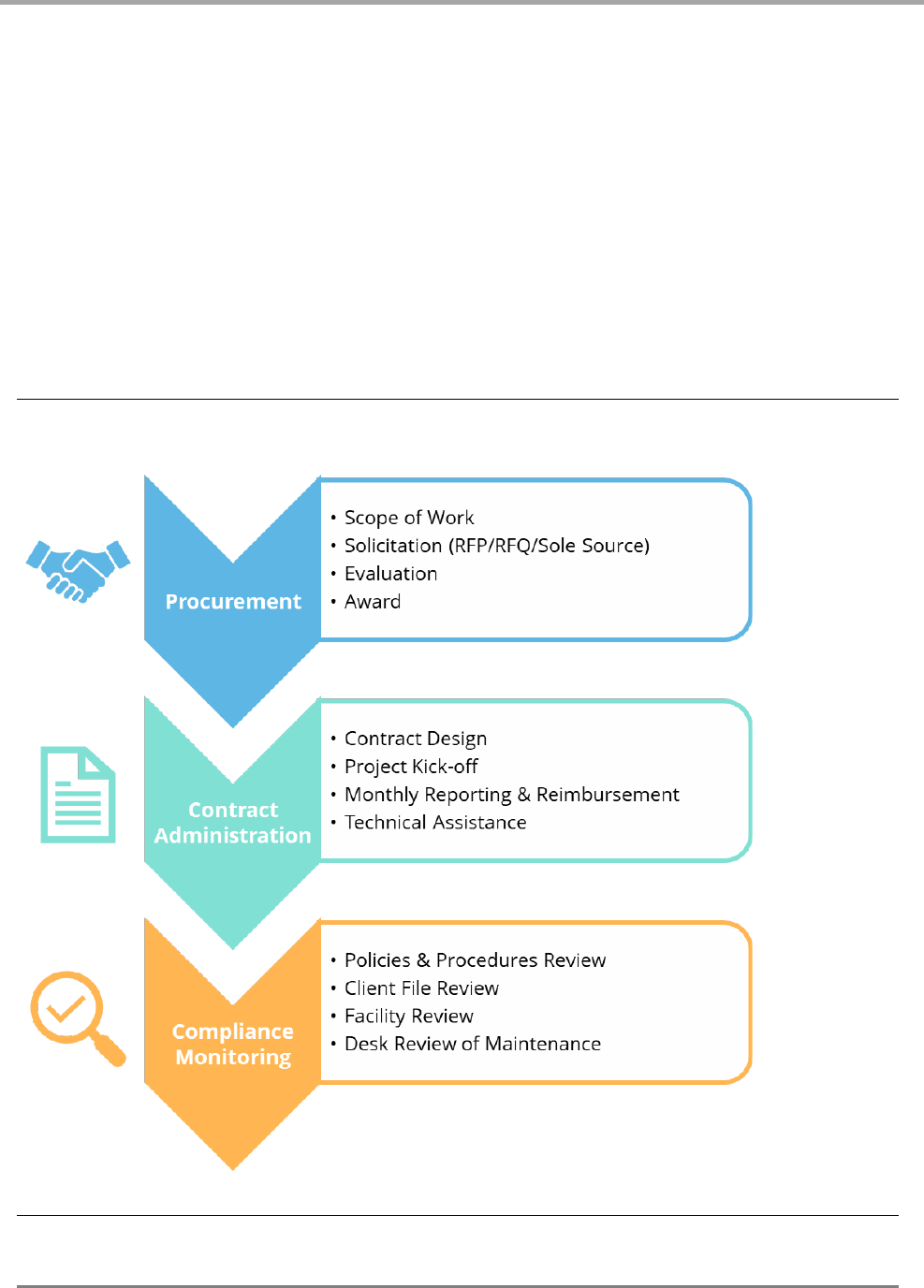
Performance Audit of SDHC’s Homelessness Services Contract Management
OCA-23-07 Page 6
means to oversee City and SDHC activities, approves contracts,
and funds pilot programs. SDHC is governed by the Housing
Authority, which has final authority over SDHC’s budget and
major policy changes.
SDHC’s contract
management process
has strict protocols for
contract procurement,
administration, and
compliance monitoring.
Most of the City’s contracts related to homelessness services are
administered by SDHC. SDHC’s contract management process,
summarized in Exhibit 4, consists of three parts: (1)
procurement, (2) contract administration, and (3) compliance
monitoring.
Exhibit 4
SDHC Follows a Detailed Process of Contract Management, from Solicitation to
Annual Compliance Monitoring
Source: OCA generated based on information from SDHC.

Performance Audit of SDHC’s Homelessness Services Contract Management
OCA-23-07 Page 7
SDHC’s Procurement Policy sets requirements for procurement
to ensure that SDHC’s purchasing and contracting functions
promote administrative flexibility and efficiency. The policy also
maintains prudent internal controls and compliance with
applicable statutes and regulations.
The procurement policy lays out specific requirements and
restrictions on this process, such as:
Which contracts require a formal solicitation process
based on a monetary threshold;
When sole source procurement is allowed;
How contracts are evaluated; and
How and by whom contracts are approved depending
on the monetary amount.
After SDHC selects a contractor, the contract moves into the
contract administration stage with the Homeless Housing
Innovations team (HHI). Contract administration involves the
ongoing monitoring of contractor performance, technical and
programmatic assistance, and the monitoring and collection of
data.
Some examples of contract administration conducted by HHI
include:
Annual trainings to cover critical changes to fiscal
procedures, broad changes to program guidelines, and
more;
On-site visits to participate in Joint Hazard Assessment
Teams (JHAT) and observe shelter conditions for health
and safety hazards;
Technical assistance to help problem-solve issues, such
as interagency coordination and the planning and
execution of client housing goals;
Online meetings with program staff to discuss and
train on financial tracking and specific program
guidelines; and

Performance Audit of SDHC’s Homelessness Services Contract Management
OCA-23-07 Page 8
Monthly data reporting using the Data Collection Tool
(DCT), which includes enrollment levels, performance
metrics, basic demographics, and program staffing.
SDHC’s Equity and Compliance Assurance team performs annual
sub-recipient monitoring by looking at program outcomes and
requirements. To perform monitoring, staff complete the
following:
Program policies and procedures review;
Participant files review, including review of the intake
process, case management papers, and exit
documents for a sample of participant files;
Annual facility reviews for minimum habitability
requirements;
6
and
Desk review of inspections and maintenance,
necessary permits, and other operational
documentation.
Audit Scope and
Objectives
The scope of this audit was homelessness services contracts
administered by SDHC that started during FY2018 through
FY2022. Programs within scope covered $63.8 million of SDHC’s
$128 million homelessness budget in FY2022. The scope did not
include contracts administered by HSSD because HSSD had not
administered any homelessness services contracts for longer
than a year during the scope period. However, HSSD and other
City departments—including General Services Facilities Division
(Facilities) and DREAM—are involved in maintenance conducted
at City-owned and leased properties used by homelessness
services providers.
The objectives of the audit were to:
1. Determine whether SDHC procures homelessness services
contracts according to leading practices;
2. Determine whether SDHC adequately monitors contract
compliance; and
6
SDHC staff informed us that on-site compliance monitoring was temporarily suspended due to the COVID-19
pandemic, but that SDHC is planning out how to restart in-person reviews.

Performance Audit of SDHC’s Homelessness Services Contract Management
OCA-23-07 Page 9
3. Determine whether SDHC holds contractors accountable
for following best practices in providing homelessness
services.

Performance Audit of SDHC’s Homelessness Services Contract Management
OCA-23-07 Page 10
Audit Results
Finding 1: SDHC follows its policies and procedures for
contract procurement, but can improve its process to
identify sole sourced contractors’ potential conflicts of
interest.
A key step to effective provision of contracts is a strong procurement policy, which should
protect the public interest by awarding contracts that represent the best overall value and
protect against conflicts of interest. We found that the San Diego Housing Commission (SDHC)
generally follows its contract procurement policies and procedures with one specific
exception. In reviewed sole sourced contracts, SDHC did not obtain Statements of Public
Disclosure—which provide information on ownership and leadership interests—as prescribed
in its internal conflict of interest policy. SDHC confirmed that it typically does not collect
Statements of Public Disclosure for sole sourced contracts, which accounted for 42 of 93
homelessness services contracts during FY2018 through FY2022, totaling over $70 million in
contract value. This increases the risk that potential conflicts are not identified and prevented.
We recommend that SDHC update its procedures for sole sourced contracts to require this
disclosure.
SDHC followed its
procurement policy
while obtaining
contracts, but did not
follow its separate
conflict of interest
policy for sole sourced
contracts.
As mentioned in the Background, SDHC’s Statement of
Procurement Policy describes the requirements and procedural
steps for SDHC to procure homelessness services contractors.
The U.S. Department of Housing and Urban Development (HUD)
requires that public housing agencies, including SDHC, adopt a
procurement policy that conforms with federal law and includes
recommended best practices. SDHC adopted such a policy,
which was approved by the Housing Authority of the City of San
Diego, effective January 31, 2017. To determine the extent to
which SDHC followed this policy, we reviewed:
Cost analyses and independent cost estimates for
awarded contracts;
Evaluation scores for contractor proposals;
Sole source justifications to determine eligibility of sole
sourced contracts;
Contractor proposals to determine if they included
required conflict of interest documents; and

Performance Audit of SDHC’s Homelessness Services Contract Management
OCA-23-07 Page 11
Records from the SDHC Board of Commissioners and
the Housing Authority of the City of San Diego to
determine whether the contracts were appropriately
approved.
We tested a sample of 29 contracts
7
during FY2018 through
FY2022. The contracts covered a variety of service providers and
intervention types. We separated the contracts into three
groups, including:
The housing group, which contained 6 contracts
covering 6 separate permanent supportive housing
and rapid re-housing programs totaling $24 million;
The shelter and transitional housing group, which
contained 18 contracts covering 9 separate emergency
shelter and bridge shelter programs totaling $124
million; and
The support group, which contained 5 support
contracts covering 4 separate safe parking, family
reunification, and storage center programs totaling
$13 million.
Our sample covered $160 million of the $187 million in
homelessness services contract value in our scope. Our sample
also covered 10 of the 24 homelessness services contractors
8
awarded contracts during the scope period, including 9 of the
top 10 contractors by total awards.
We found the following, which is summarized in Exhibit 5:
Reviewed contracts followed the authorized
procurement path. This helps provide assurance that
public funds are only committed after following a
proper procurement process, including ensuring
reasonable cost.
7
We requested documentation for 30 contracts. After receiving documents, one was an option and not a full
contract. Contracts were randomly selected out of 94 weighted by contract value. This is not a statistically
significant random sample and cannot be extrapolated to all contracts. Appendix C contains the description of
sample programs, including name, provider, contract amount, and start/end date. See Appendix B for more
details on audit procedures.
8
Of these contractors, 12 received less than $1 million over the scope period.

Performance Audit of SDHC’s Homelessness Services Contract Management
OCA-23-07 Page 12
Reviewed contracts were evaluated in accordance with
policy. This helps provide assurance that contracts are
awarded to the best proposal.
Reviewed competitive procurements included
Statements for Public Disclosure. This helps provide
assurance that contractors do not have a conflict of
interest.
Reviewed sole source procurements did not include
Statements for Public Disclosure. SDHC confirmed that
these were not collected for sole source procurements
during the audit scope. This creates a potential for
contractor conflict of interest.
Reviewed contracts were approved by the appropriate
authority. This helps ensure accountability and good
stewardship of public funds.
Exhibit 5
SDHC Generally Followed Procedures for Procurement Outside of One Aspect
Source: OCA generated based on review of procurement documentation for 29 sampled contracts.

Performance Audit of SDHC’s Homelessness Services Contract Management
OCA-23-07 Page 13
SDHC required sole sourced contracts to provide a written
justification and meet the prescribed conditions for use.
Justifications for our sampled contracts included the Hepatitis A
outbreak, the COVID-19 pandemic, and maintaining a continuity
of care for affected individuals. As stated above, sole sourced
contracts in our sample were approved by the appropriate
authority (i.e., the SDHC CEO, Board of Commissioners, or the
Housing Authority of the City of San Diego).
SDHC’s procurement
policy does not require
Statements for Public
Disclosure for sole
sourced contracts.
Conflict of interest policies help prevent the erosion of trust that
can occur if a government employee were to put their own
interests ahead of the public’s interests. Therefore, SDHC does
not allow its employees or agents to participate in the award or
administration of a contract if a conflict—real or apparent—
would be involved. To ensure SDHC identifies all conflicts of
interest, the SDHC Conflict of Interest Policy states that
contractors receiving an award of $50,000 or more must submit
a Statement for Public Disclosure. Statements of Public
Disclosure require names of charitable organizations’ leadership
in order to identify potential conflicts of interest with SDHC’s
procurement procedures. We reviewed competitive
procurements that required these statements; however, SDHC
staff stated they typically do not require these statements for
sole sourced contracts. Consequently, during our analysis of
sample procurement documents, we found that SDHC collected
these disclosures for all competitive procurements but approved
all sample sole sourced contracts without the required
disclosure statements. While SDHC policies mention other
controls
9
to prevent fraud, sole sourced contracts present a
higher risk for conflicts of interest. This makes it especially
important for SDHC to require Statements for Public Disclosure
on sole sourced contracts in addition to competitively bid
contracts.
9
SHDC Procurement Policy Section 3.4 allows the CEO, or their designee, to establish Administrative
Regulations that will facilitate appropriate review of procurement-related actions. SDHC should use this tool to
quickly establish a process to obtain Statements for Public Disclosure for sole-sourced contracts.

Performance Audit of SDHC’s Homelessness Services Contract Management
OCA-23-07 Page 14
Recommendation 1.1
The San Diego Housing Commission should issue an
Administrative Regulation to require Statements for Public
Disclosure for sole source contracts in accordance with its
Conflict of Interest Policy and collect required statements for all
current and future contracts over $50,000.
(Priority 2)
Recommendation 1.2
When the San Diego Housing Commission next updates its
Statement of Procurement Policy, it should require Statements
for Public Disclosure for sole source contracts in accordance
with its Conflict of Interest Policy.
(Priority 2)

Performance Audit of SDHC’s Homelessness Services Contract Management
OCA-23-07 Page 15
Finding 2: SDHC ensures contracted homelessness
services programs follow best practices through contract
design, ongoing administration, and compliance
monitoring.
Once a contract is awarded, contract administration is important to maintain performance.
Best practices in the operations of homelessness services programs ensure persons
experiencing homelessness receive a consistent and coordinated minimum standard of care.
We found that SDHC ensures contracted programs follow best practices across all aspects of
contract administration.
To test SDHC’s controls for securing compliance with these standards, we reviewed
documents from our sample of 29 contracts relating to five areas of best practice, across three
different aspects of contract administration. Documents we reviewed included:
Signed contracts between SDHC and contractors;
Data Collection Tools (DCTs)
10
; and
Annual Compliance Monitoring Reports.
Additionally, we conducted 15 site visits of programs and conducted interviews with program
staff. Exhibit 6 summarizes our findings.
10
Contracts require a monthly data collection tool that reviews progress on the contract metrics and provides a
narrative section for program staff to explain any shortcomings or barriers that may prevent them from
achieving the target.

Performance Audit of SDHC’s Homelessness Services Contract Management
OCA-23-07 Page 16
Exhibit 6
SDHC Ensures Programs Follow Regional and National Best Practices Across Aspects
of Contract Administration
Source: OCA generated from review of 29 sampled contracts and monitoring documents.
SDHC requires trauma-
informed care
procedures and
monitors contractor
compliance with this
requirement.
For a program to be considered trauma-informed, it must realize
the widespread impact of trauma, recognize the signs and
symptoms of trauma in clients, and respond by integrating
knowledge about trauma into policies and practices. Continuum
of Care (CoC) standards state that programs need to use a
trauma-informed approach and must incorporate the principles
of trauma-informed care in their written policies and
procedures, and in staff training protocols.

Performance Audit of SDHC’s Homelessness Services Contract Management
OCA-23-07 Page 17
Overall, we found that SDHC ensures contractors incorporate
trauma-informed care principles. Contracts we reviewed
included language requiring the use of trauma-informed care.
Program staff training logs we reviewed also showed evidence
that staff attended trainings on trauma-informed care. To learn
more about staff experience, we surveyed 67 contractor staff
11
to determine if they agreed with statements about trauma-
informed topics. Topics included training, knowledge, physical
environment, and crisis procedures. As shown in Exhibit 7, we
found that staff generally agreed with these statements, with no
more than five staff disagreeing with any given statement.
Finally, while conducting site visits, we observed that sites
generally had trauma-informed environments.
Exhibit 7
Staff Believe Their Work is Providing Trauma-Informed Care that is Flexible to Meet
the Clients’ Needs
Source: OCA generated based on survey responses.
11
We provided the survey either during auditor site visits or through an online link. We received 67 responses
from staff at multiple agencies and programs. See Appendix B for more details on our site visits.

Performance Audit of SDHC’s Homelessness Services Contract Management
OCA-23-07 Page 18
SDHC also reviews policies and procedures for evidence that a
program is ground in trauma-informed care. The monitoring
reports we analyzed demonstrated that SDHC reviewed program
policies and procedures for trauma-informed care.
SDHC requires Housing
First procedures and
monitors contractor
compliance with this
requirement.
Housing First prioritizes rapid placement and stabilization in
permanent housing without service participation requirements
or preconditions for entry. California State law requires
recipients of State funding to adopt guidelines and regulations to
include Housing First policies. Additionally, CoC Community
Standards recommend programs have a Housing First approach.
This approach incorporates other best practices, such as harm
reduction, and can be used in all phases of the homeless
housing and services system.
The SDHC contracts we analyzed required programs to have
Housing First principles. We also saw evidence of SDHC assisting
programs in following Housing First principles. For example, in
meeting notes for monthly DCT review, we saw evidence that
SDHC staff provided technical assistance on participant
immigration status and joined case conferencing to assist with
the housing of four undocumented households. Program staff
also stated that SDHC worked with them to ensure referred
clients would meet a funder’s income verification and addressed
the issue before it was escalated.
Throughout the lifetime of the contract, SDHC monitors a
program’s adherence to Housing First. Specifically, during the
annual compliance monitoring process, SDHC staff checked for
Housing First principles. In the program review procedures, staff
check client intake paperwork and program files against a
number of Housing First test steps. Staff review the intake
paperwork for additional screening, make sure participation in
services is voluntary, and ensure no requirements for sobriety.
SDHC requires client
feedback procedures
and monitors
contractor compliance
with this requirement.
CoC standards expect programs to engage participants in
ongoing program evaluation, solicit feedback on program
services quality, and make improvements based on input. To
help programs meet this requirement, SDHC contracts require
each program’s policies contain a way for clients to provide
feedback. Specifically, FY2022 contracts require the collection of

Performance Audit of SDHC’s Homelessness Services Contract Management
OCA-23-07 Page 19
client satisfaction data and quarterly reports to SDHC. The
reports should include how findings were incorporated into
service delivery and program design.
Program staff described changes that directly resulted from
client feedback, including a new donation area, elimination of a
laundry schedule, and creation of a clean and sober area of a
shelter. We observed kiosks that SDHC installed to obtain
anonymous feedback from participants. At the kiosks,
participants are asked about their overall stay, safety,
cleanliness, and more. SDHC staff stated that they discuss any
issues or suggestions in meetings with providers. As a result of
client feedback, staff described positive changes at the
Homelessness Response Center, including refresher trainings
and improved staffing for the busiest times. During annual
monitoring, the SDHC compliance team reviews program
policies and procedures for compliance with client feedback
requirements and discusses with the program examples of
feedback that are being incorporated.
SDHC requires exit
policies, monitors
contractor compliance
with this requirement,
and is working with
contractors to
standardize policies.
While programs are aiming to get participants into permanent
housing, circumstances require that programs also have a
process for involuntary exit or termination of services. There is
no one best exit policy, but national and regional best practice
agencies describe aspects including:
The process must include written notice and a formal
review process.
Rules should be designed to help individuals get into
permanent housing and should be centered around
safety, terminating assistance only in the most severe
cases.
In most instances, terminations should not mean
permanent bans. However, shelters can have different
standards for termination of assistance and could
permanently ban participants who violate rules or
create dangerous situations.
Any terminations or bans should not prohibit entry
into other supportive services in the area.

Performance Audit of SDHC’s Homelessness Services Contract Management
OCA-23-07 Page 20
The most recent SDHC contracts we reviewed require that
programs have policies around grievances, progressive conflict
resolution, and client appeals. The contracts also require that
programs give participants a service agreement, which includes
violations that lead to immediate terminations. SDHC and
program staff both stated that they were in conversations
around standardizing the exit policy to create consistency across
the system.
To monitor these policies throughout the lifetime of the contract,
SDHC collects information on exits due to noncompliance with
its monthly and annual data collection tool (DCT). Of the 39 DCTs
we reviewed that measured negative outcomes, only 2 showed a
failure to meet the goal.
During the annual monitoring process, SDHC staff check the
program’s policies and procedures for the contract
requirements. Staff also review client files to see if terminated
clients were given due process. In the monitoring reports we
analyzed, SDHC reported 142 client files as involuntarily exited
and all client files contained evidence of due process.
SDHC designs contracts
to meet local standards
on program data
collection and
performance
management.
Homelessness services program evaluation is important for
determining if services are impactful. Evaluations track program
performance and allow for mid-course corrections. CoC
Community Standards expect that all programs regularly review
program data throughout the year to support ongoing program
decision-making and use this data to make improvements.
Additionally, CoC Community Standards recommend programs
discuss data regularly among staff and other stakeholders to
strategize activities for improvement.
SDHC contracts meet this standard
12
in a variety of ways,
including:
Requiring the use of a Homeless Management
Information System (HMIS);
Establishing performance metrics and targets;
12
We analyzed contracts over our entire scope period for language surrounding the different topics, but the
language of the bullets is from FY2022 contracts.

Performance Audit of SDHC’s Homelessness Services Contract Management
OCA-23-07 Page 21
Requiring contractors participate in compliance and
performance monitoring and improvement activities;
Requiring documentation of program progress
through monthly and term-end reports; and
Establishing possibility of a performance improvement
plan if contract benchmarks are not met.
Systemwide limitations
make it difficult for
programs to achieve
community targets.
For specific contracts, SDHC and RTFH staff informed us that
performance metric targets are based off of regional goal-setting
documents, such as the Community Action Plan and CoC
Community Standards, funder-specific requirements, and
analyses of past performance. Due to the COVID-19 pandemic,
many of these targets are out-of-date and do not fully capture
the current environment for contractors. SDHC staff stated that
RTFH plans to engage with regional stakeholders on program
goals this year.
For our sample of 29 contracts, we analyzed performance
metrics for different programs in three different groups:
permanent housing, emergency shelter, and support services.
13
Each program has different metrics and targets based on the
type and size of the program. We reviewed annual data
collection tools and combined different metrics into five broad
categories
14
:
Persons Served: How many individuals the program
served. For example, a storage center’s goal may be to
serve 500 unique individuals in one year.
Occupancy/Utilization: Rate at which beds or case
management slots were filled. For example, an
emergency shelter’s goal may be to be at least 95
percent occupied, on average, for a contract year.
Positive Outcome: Rate at which participants
achieved permanent or other longer-term housing
OR the number of households housed. For example,
13
We analyzed some contracts that did not end up in groups because they did not last a full fiscal year or did
not have applicable target metrics.
14
To standardize the results, we analyzed whether the program achieved its goal each year (or was within 10
percent of achieving its goal). For example, a program’s goal could be to move 100 individuals into permanent
housing. If the program housed at least 90 individuals, we would count it as successful; housing less than 90
individuals would count as unsuccessful.

Performance Audit of SDHC’s Homelessness Services Contract Management
OCA-23-07 Page 22
a rapid re-housing program’s goal may be to house 56
persons in one year.
Negative Outcome: Rate at which participants
were involuntarily exited from the program. For
example, an emergency shelter’s goal may be to exit
less than 20 percent of participants for non-
compliance with program rules.
Returns to Homelessness: Rate at which
participants who were housed returned to
homelessness within the next 6–24 months. For
example, a rapid re-housing project may have a goal
that 85 percent of participants who positively exited
are still permanently housed after 12 months.
Below, we present results of our analyses separated into the
different groups of programs: permanent housing, emergency
shelter, and support services. Following the results of our
analyses, we go into detail on external factors—such as staffing
shortages, high housing prices, and COVID-19—that contributed
to vendor underperformance.
Permanent Housing
The permanent housing group contains the permanent
supportive housing programs and rapid re-housing programs,
totaling 5 of the 29 sampled contracts. As shown in Exhibit 8,
the permanent housing group generally succeeded in achieving
goals for positive outcomes but had mixed results on persons
served.

Performance Audit of SDHC’s Homelessness Services Contract Management
OCA-23-07 Page 23
Exhibit 8
Permanent Housing Programs Generally Achieved Targets for Positive Outcomes, but
Returned Mixed Results on Persons Served
Note: Each contract may not report on all metrics, or a specific contract year may not have a target
for that metric. In these cases, we did not analyze the performance of that program year.
Additionally, COVID-19 impacted contractor performance. For more information, see below section
titled “COVID-19 related policies made it difficult for contractors to achieve performance targets.”
Source: OCA generated from review of 5 sampled permanent housing contracts and annual data
collection tools.
Shelter
The shelter group contains the different emergency shelter and
bridge shelter contracts, totaling 16 of the 29 sample contracts.
As shown in Exhibit 9, the shelters succeeded in achieving their
goals for negative outcomes. However, they returned mixed
results on occupancy/utilization goals, and failed to meet targets
for positive outcomes and avoiding returns to homelessness
around half the time.
7
10
2 2
5
2
1 1
Persons Served Positive Outcome Avoiding Negative
Outcome
Avoiding Return to
Homelessness
Total Years
Successful Years Unsuccessful Years
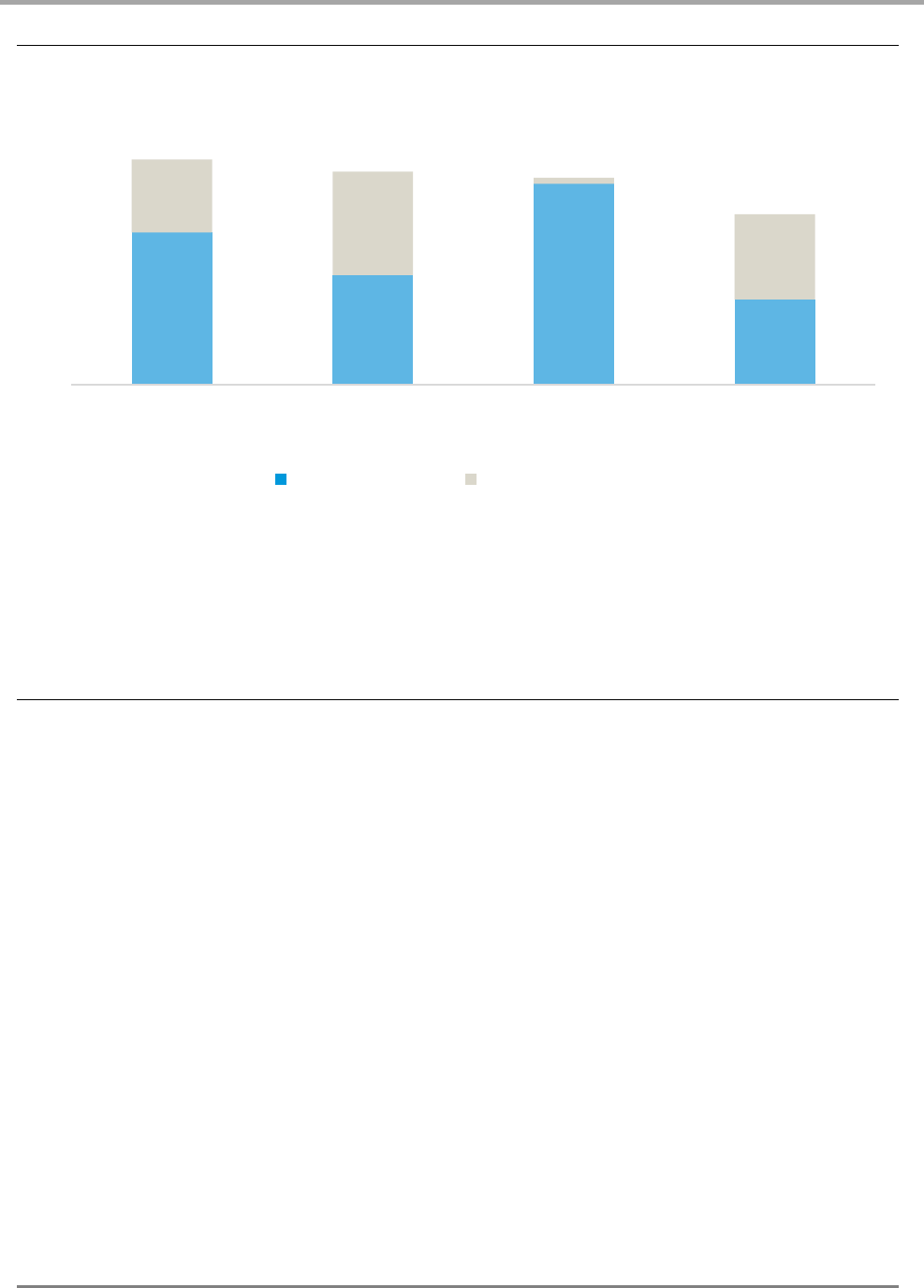
Performance Audit of SDHC’s Homelessness Services Contract Management
OCA-23-07 Page 24
Exhibit 9
Shelters Achieved Negative Outcome Goals but Often Missed Targets
for Positive Outcomes
Note: Each contract may not report on all metrics, or a specific contract year may not have a target
for that metric. In these cases, we did not analyze the performance of that program year.
Additionally, COVID-19 impacted contractor performance. For more information, see below section
titled “COVID-19 related policies made it difficult for contractors to achieve performance targets.”
Source: OCA generated from review of 16 sampled shelter contracts and annual data collection
tools.
Support Services
The support services group contains the safe parking program,
family reunification program, and the storage connect centers,
totaling 4 of the 29 sample contracts. These programs met
negative outcome goals, returned mixed results on persons
served goals, and failed to meet occupancy/utilization goals.
Exhibit 10 shows the results of this group’s analysis.
25
18
33
14
12
17
1
14
Occupancy/Utilization Positive Outcome Avoiding Negative
Outcome
Avoiding Return to
Homelessness
Total Years
Successful Years Unsuccessful Years

Performance Audit of SDHC’s Homelessness Services Contract Management
OCA-23-07 Page 25
Exhibit 10
Support Programs Showed Mixed Results on Goals Related to Persons Served
Note: Each contract may not report on all metrics, or a specific contract year may not have a target
for that metric. In these cases, we did not analyze the performance of that program year.
Additionally, COVID-19 impacted contractor performance. For more information, see below section
titled “COVID-19 related policies made it difficult for contractors to achieve performance targets.”
Source: OCA generated from review of 4 sampled support services contracts and annual data
collection tools.
Staffing and housing
inventory shortages
impacted contractor
performance.
As mentioned above, external factors contributed to low
performance. Staffing issues plagued providers in recent years,
limiting their ability to provide in-depth case management
services. While contracts require programs to provide
appropriate staffing levels, SDHC staff understand contractors
may not have the funding necessary to learn the root cause of
staffing shortages. Therefore, SDHC is trying to address this
systemwide issue in a variety of ways. SDHC partners with San
Diego City College to operate the Homelessness Program for
Engaged Educational Resources. This program provides
specialized education, training, and job placement assistance to
develop the workforce needed for homelessness programs and
services.
Staffing shortages are likely exacerbated by relatively low wages.
Program management noted that due to wages, staff compete
with participants for housing resources. Recently, SDHC
commissioned a salary study which showed a majority of
6
2
3
2
Persons Served Occupancy/Utilization Avoiding Negative Outcome
Total Years
Successful Years Unsuccessful Years

Performance Audit of SDHC’s Homelessness Services Contract Management
OCA-23-07 Page 26
frontline homelessness staff cannot afford even a one-bedroom
unit without being cost-burdened. The report recommended
that SDHC and the City collaborate to find funding to shift from
minimum wage to living wage as the benchmark for comparing
wages.
Contractors also underperformed on positive outcomes due to
system-wide limitations with the high price of housing in the
area, low availability of permanent supportive housing, and low
rental vacancy rates. Additionally, program staff stated that
“returns to homelessness” does not fully reflect program
performance. Staff often have little to no insight into a
participant’s actions and circumstances once they exit the
program. For instance, shelter programs are not modeled to
provide case management after individuals exit the program. All
of these factors may impact performance against metrics and
make it difficult to achieve targets that might be achievable in
other parts of the country or region.
COVID-19 related policies
made it difficult for
contractors to achieve
performance targets.
Finally, program narratives provided on DCTs and program
underperformance over time demonstrate the impact of COVID-
19 on operations. The related policies made it more difficult for
participants to gain employment and affordable housing, and
lowered occupancy rates due to quarantine units and closure of
upstream referral locations. Despite these restrictions, programs
still reported performance against original contract goals.
Exhibit 11 shows the rate at which programs achieved their
goals during the five years in our scope period.

Performance Audit of SDHC’s Homelessness Services Contract Management
OCA-23-07 Page 27
Exhibit 11
Program Performance Declined During the COVID-19 Pandemic
Source: OCA generated from review of 24 sample program’s annual data collection tools from
FY2018 through FY2022.
Our analysis showed that some programs experienced large
shifts in occupancy or persons served during this time. The
Family Reunification Program went from serving 103 percent of
its goal in FY2019 to serving only 36 percent of its goal in FY2021.
Transitional housing program staff mentioned that many
referrals to their program come through the court system.
However, since COVID-19, referrals have had difficulty obtaining
the necessary proof of chronic alcoholism needed to enroll in
the program. Shelter staff voiced similar concerns, stating that
COVID-19 policies lowered the number of spaces that could be
occupied. Finally, according to SDHC, persons served for rapid
re-housing programs declined during COVID-19 due to the
shifting need toward longer-term rental assistance to prevent
returns to homelessness. As the region continues recovering
from the pandemic, targets and performance should continue to
be analyzed within the context of these external factors.
73%
81%
76%
60%
52%
FY2018 FY2019 FY2020 (First Year
Affected by
COVID-19)
FY2021 FY2022
Goal Completion

Performance Audit of SDHC’s Homelessness Services Contract Management
OCA-23-07 Page 28
SDHC followed best
practices in
performance
management, but its
ability to change
providers is limited by a
low number of bid
respondents.
Throughout the lifetime of a contract, programs should be
evaluated with a mixed methods approach that includes
information about how the programs are implemented as well
as data on client outcomes. The National Association of State
Procurement Officials recommends monitoring performance by:
Collecting and analyzing information needed to
evaluate supplier performance;
Monitoring and providing feedback to the supplier
about performance standards;
Identifying critical areas for improvement; and
Implementing agreed-upon steps to remedy issues.
According to SDHC staff, their first course of action when
approaching an underperforming program is to compare
performance to other similar programs and the system at large.
Staff use the recommended mixed methods approach when
comparing across the system. Contracts require a monthly data
collection tool that reviews progress on the contract metrics and
provides a narrative section for program staff to explain any
shortcomings or barriers that may prevent them from achieving
the target. We observed during an update meeting and learned
from interviews that SDHC staff meet with program staff
regularly regarding performance targets and that the narrative
section is helpful to explain any sort of challenges or information
that are not captured by the metrics. Additionally, SDHC staff
monitor program staff vacancies to assess program
performance in context. SDHC and program staff informed us
that SDHC staff participate in case conferencing to try and
contribute to solutions for clients with specific barriers or
challenges. Program staff stated that this level of involvement
can be helpful and goes beyond the participation of other
funders.
To support this ongoing performance management effort,
SDHC’s compliance team evaluates policies and procedures for
multiple aspects. The compliance team reviews documents and
interviews staff for evidence that a program has the necessary
data systems to collect information, documents project
outcomes, and adheres to RTFH’s performance standards and
requirements. Additionally, we reviewed monitoring reports for

Performance Audit of SDHC’s Homelessness Services Contract Management
OCA-23-07 Page 29
evidence of fiscal controls to make sure program expenses and
administrative costs were allowable, reasonable, and
documented.
According to SDHC, competitive bids often return a small
number of respondents and this requires SDHC to try and work
with the contractors it has, rather than be punitive. Out of the
contracts we reviewed that were competitively awarded, there
was an average of 137 vendors notified and only 4 respondents.
We interviewed staff from the City of Sacramento and the City
and County of San Francisco about procurement outreach and
found that while the number of respondents in San Diego was
comparatively low, neither city indicated conducting any
additional outreach beyond what SDHC currently performs.
Overall, we found that SDHC ensures contractors follow best
practices by having checks at the contract design stage,
administering contracts on an ongoing basis, and monitoring
compliance through an annual process. Therefore, we have no
recommendations for this finding. It is important for
administration of homelessness contracts to continue to use
best practices to ensure good stewardship of public funds and
maximize performance.

Performance Audit of SDHC’s Homelessness Services Contract Management
OCA-23-07 Page 30
Finding 3: The City lacks documented processes for
repairs at City-owned or leased homelessness facilities,
causing persistent unsafe and unsanitary conditions at
some locations.
We found a lack of documented City processes resulted in delayed repairs at some City-owned
or leased homelessness facilities.
15
We observed disrepair at sites, including shelters, a safe
parking lot, and the Homelessness Response Center. We did not observe similar conditions at
sites owned or leased by the contractor or the San Diego Housing Commission (SDHC). We
also reviewed maintenance requests submitted to the City by providers and SDHC that were
not addressed in a timely fashion—with potentially hazardous situations lasting for months.
At City-owned and leased sites, SDHC’s contracts require contractors to report any
maintenance or repair needs to SDHC. SDHC has a process for receiving, evaluating, and
submitting maintenance and repair requests to the City through the Homelessness Strategies
and Solutions Department (HSSD). However, HSSD does not have a documented process for
receiving and submitting maintenance and service requests to those responsible for
performing maintenance.
Additionally, service providers may be unaware of the status of their maintenance and repair
requests because the City does not have a process for providing information on the status of
these requests. This can lead to deterioration of facilities and damaged trust between the
service providers and their clients.
Areas of homelessness
facilities are unsafe,
unclean, and in
disrepair.
Throughout the course of the audit, we conducted a number of
site visits at program facilities from sampled contracts.
16
These
visits occurred at both City-owned or leased sites and sites
owned or leased by the contractor or SDHC. We found that sites
where maintenance was fully the contractor’s responsibility were
in good repair. However, we observed unsafe or unclean
conditions at sites where the City was partially responsible for
maintenance. Some examples of disrepair were moldy ADA-
showers, as shown in Exhibit 12, a ripped privacy mesh at the
Golden Hall shelter, a broken HVAC system at a sprung shelter, a
15
The audit covered programs administered by SDHC from FY2018 to FY2022. Ten of these programs were
located at City-owned or leased facilities. These programs included the safe parking program, whose contract is
administered by HSSD as of July 1, 2022.
16
The sites visited were part of our value-weighted random sample of contracts and are not necessarily
representative of all sites.

Performance Audit of SDHC’s Homelessness Services Contract Management
OCA-23-07 Page 31
broken window at the Homelessness Resource Center, and a
broken streetlight at a safe parking site.
Exhibit 12
Mold in an ADA Shower at Golden Hall Resulted in Closure of the Shower, Leaving
Only One ADA Shower for at Least Two Months
Source: Photographed by OCA during site visit at Golden Hall on October 28, 2022.
Additionally, we reviewed Joint Hazard Assessment Team (JHAT)
reports,
17
which included observations of missing cover plates
on light poles, exposed wires, and falling ceiling panels. Some of
these issues were reported on consecutive JHAT reports with no
information regarding remediation.
17
JHAT observations are monthly or bi-monthly observations from SDHC, City staff, and site staff.

Performance Audit of SDHC’s Homelessness Services Contract Management
OCA-23-07 Page 32
The City is responsible
for some maintenance
and repairs at City-
owned and leased
properties.
At City-owned facilities, the party responsible for completing
repairs varies by location and program. Uncertainty and
disagreements over the responsible party can lead to delays in
fixing the problem. Additionally, there are different agreements
that make establishing the responsible party unclear. For
example, the Memorandum of Understanding for Bridge
Shelters between SDHC and the City states that SDHC is
responsible for ensuring maintenance of porta-potties or
modular restrooms, while the City is responsible for structural
maintenance and repairs.
City staff informed us that determining responsibility between
City departments also causes delays. For example, auditors
noticed a broken streetlight that caused a safety risk at a safe
parking facility. When asked about the status, City staff said the
repair was delayed due to “back and forth” between two City
departments on who was responsible for both fixing the light
and clearing brush necessary to access the light. While HSSD
staff notified the appropriate party to complete the repair, staff
could not confirm when the repair happened.
From a contractor perspective, SDHC contracts establish the
contractor as the responsible party to keep the site clean and
maintained and require the contractor to notify SDHC of any
issues that require repair. In addition, license agreements may
provide an additional assignment of responsibility. For example,
the license agreement between Father Joe’s Villages and the City
for Golden Hall establishes Father Joe’s Villages as the
responsible party for waste, damage, or destruction.
In our interviews, we learned there is disagreement between a
contractor and the City regarding who should be responsible for
“vandalism” conducted by shelter residents. While license
agreements might establish the contractor as the responsible
party, program staff informed us that it is difficult to control
actions of shelter residents if they do not have a say in who
resides in their facility.
18
For example, as a result of a JHAT assessment, a service request
for a broken outlet—pictured in Exhibit 13—was submitted to
18
Shelter residents are assigned by SDHC through a central coordinated intake process.

Performance Audit of SDHC’s Homelessness Services Contract Management
OCA-23-07 Page 33
City staff on August 23, 2022. City staff deemed it to be
vandalism and therefore did not request a work order as the
contractor is responsible for addressing vandalism. However,
the City could not provide documentation of the determination
or of its notification of the determination to SDHC or the service
provider. According to program staff, the outlet was fixed on
January 18, 2023 by a third party contracted by the City.
Exhibit 13
A Broken Outlet Remained Unfixed for Almost Five Months
Source: Maintenance request submitted by SDHC on August 23, 2022.
While initially deemed as the responsibility of the contactor, City
staff ultimately took responsibility after the issue persisted for
almost five months. Although the City has the ability to obtain
payment from the contractor for fixing these issues, City staff
stated that the City has not pursued payment.
The City does not have
a documented process
for receiving
maintenance requests
from SDHC or
contractors.
A lack of process documentation could lead to some
maintenance issues falling through the cracks. In practice,
maintenance requests originate from JHAT site visits or
contractor reports and are reported to SDHC, which receives,
evaluates, and forwards them to HSSD and the Department of
Real Estate and Airport Management. The requests then get
forwarded to the appropriate department or vendor and follow
the appropriate party’s internal process. Based on interviews
with SDHC and City departments, we found that there is a lack of
process documentation establishing contact department,
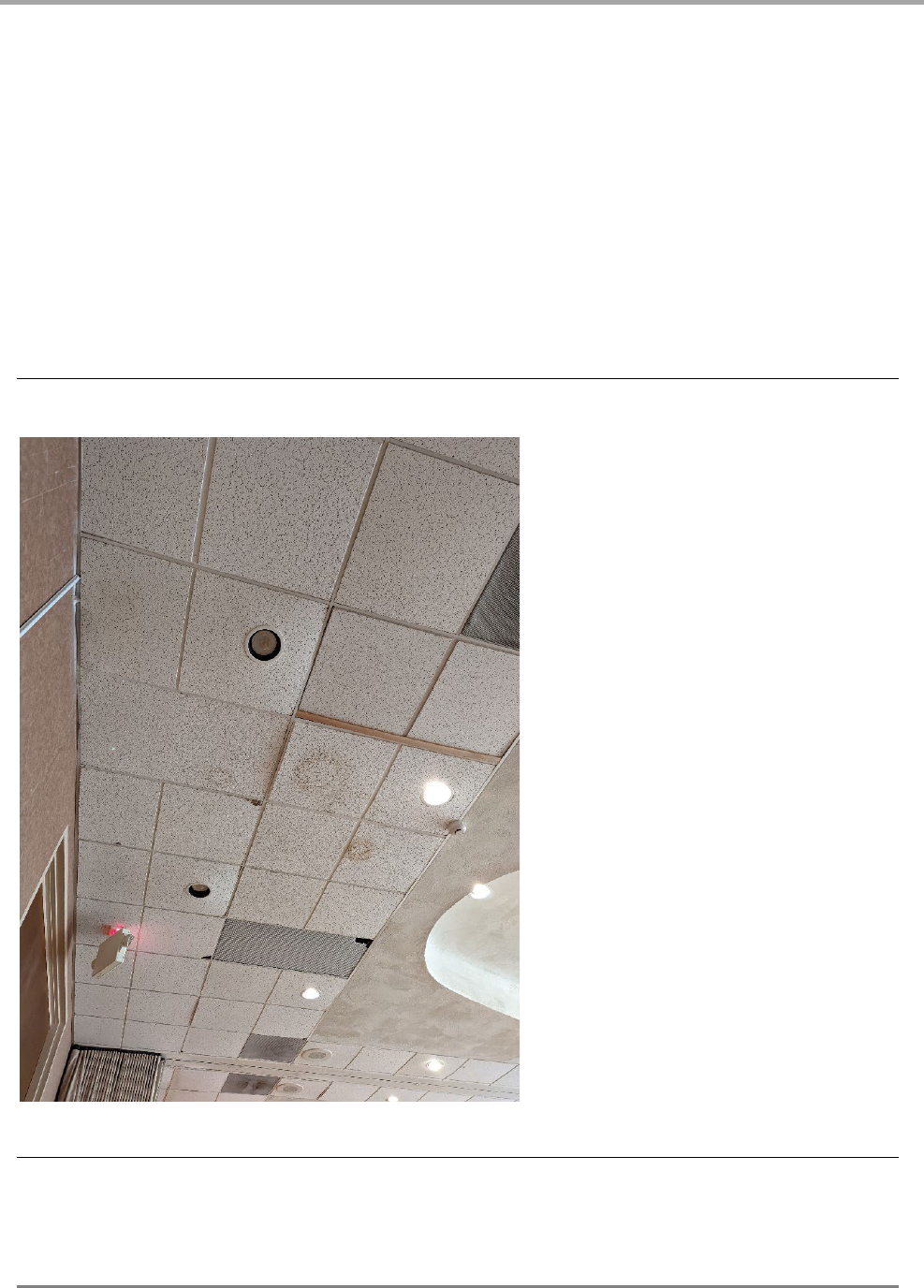
Performance Audit of SDHC’s Homelessness Services Contract Management
OCA-23-07 Page 34
timelines, and communication of progress and task completion.
Additionally, when we asked for the status of two service
requests submitted by SDHC with lengthy timelines, City staff
were unable to identify the status of the request to determine
whether it was completed. This lack of process—and the
resulting delays in fixes—caused the disrepair we observed.
Additionally, the delays risk straining the relationship between
the contractor and program participants.
For example, Exhibits 14 and 15 show the damaged ceiling tiles
we observed at a shelter, and the lengthy timeline of their repair.
Exhibits 14
Damaged Ceiling Tiles Create a Potentially Hazardous Situation
Source: Photographed by OCA during site visit at Golden Hall on October 28, 2022.
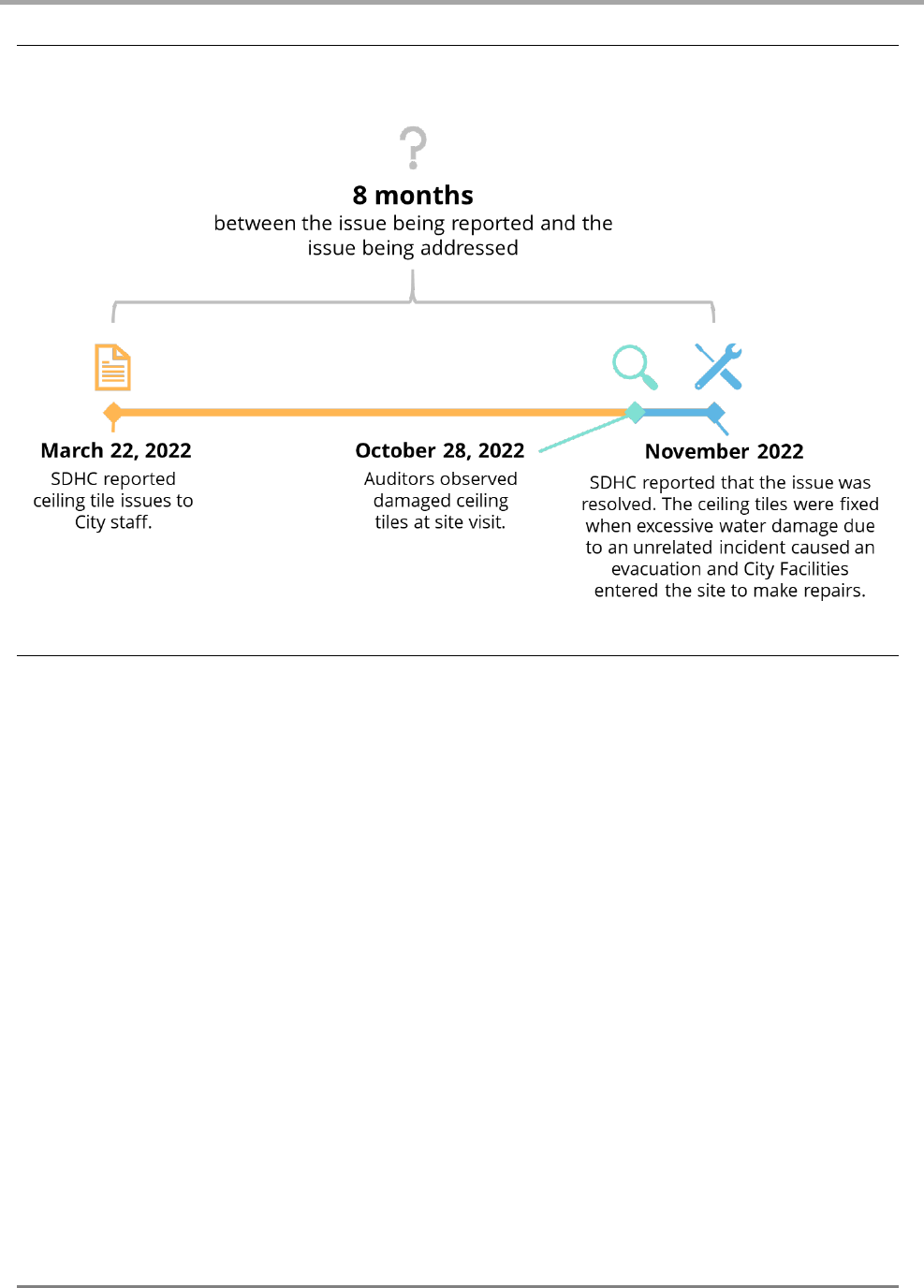
Performance Audit of SDHC’s Homelessness Services Contract Management
OCA-23-07 Page 35
Exhibit 15
Unsafe Shelter Conditions Persisted for 8 Months After the City Received a
Maintenance Request
Source: OCA generated based on maintenance request, observation, and interviews.
As mentioned in the Background, the Community Action Plan on
Homelessness assigns the Mayor’s Office with the responsibility
of coordinating City departments’ response to homelessness. A
2021 consultant memorandum found that HSSD needs to
strengthen internal partnerships across City departments and
teams. Additionally, the memorandum detailed a need for
additional documentation and clarification of the City’s policies
and procedures.
As a new department, HSSD is tasked with serving as the liaison
to homelessness services agencies and is responsible for
ensuring homelessness policies are carried out by various City
departments. As the coordinating department for the City, HSSD
could add value by tracking requests that span different
agencies and City departments. In this role, HSSD has the
opportunity to evaluate existing process and implement an
improved procedure that would help ensure accountability from

Performance Audit of SDHC’s Homelessness Services Contract Management
OCA-23-07 Page 36
the City for maintenance and repairs that are the City’s
responsibility.
HSSD has already made progress in this area. Staff provided
draft procedures for an SDHC-administered homelessness
facility that detailed roles and contact points for different
vendors. Additionally, HSSD is rolling out a “text bot” that helps
track service requests across the different agencies. These draft
procedures are a good first step, but are not applicable to all
sites, and should be properly approved. Once fully developed for
use at all sites and approved, HSSD should distribute the
procedures to all stakeholders.
Delayed repairs lead to
damaged facilities and
broken trust between
service providers and
individuals
experiencing
homelessness.
City facilities deteriorate when repairs are delayed. For example,
when a roof leak required relocation of residents at Golden Hall,
the Department of General Services Facilities Division stated that
it identified many additional repairs that it was not aware of. As
a result, the City needed to conduct significant repairs while the
residents were relocated.
Additionally, lengthy timelines for repairing facilities can damage
trust between shelter residents and service providers. Since
residents may not know who is responsible for repairs at a
shelter, they may blame the contractor for the delays. This can
lead to damaged trust, which is counterproductive to the
relationship-building required for contractors to encourage
participation in programs intended to assist individuals
experiencing homelessness and bring them into permanent
housing.
Recommendation 3.1
In order to address existing maintenance issues, the
Homelessness Strategies and Solutions Department should
coordinate with providers, the San Diego Housing Commission,
and relevant City departments to perform an inspection of all
homelessness services sites for which the City is responsible for
maintenance and repairs, and complete any identified repairs
and maintenance at those sites.
(Priority 2)

Performance Audit of SDHC’s Homelessness Services Contract Management
OCA-23-07 Page 37
Recommendation 3.2
In order to address future maintenance issues at sites where the
City is responsible for maintenance and repairs, the
Homelessness Strategies and Solutions Department should
establish a procedure to track maintenance requests between
providers, the San Diego Housing Commission (SDHC), and
relevant City departments. This procedure should contain
required information for service requests, correct routing
procedure for requests, estimated timelines for repair, and
communication of progress and task completion to SDHC and
service providers.
(Priority 2)

Performance Audit of SDHC’s Homelessness Services Contract Management
OCA-23-07 Page 38
Appendix A: Definition of Audit
Recommendation Priorities
DEFINITIONS OF PRIORITY 1, 2, AND 3
AUDIT RECOMMENDATIONS
The Office of the City Auditor maintains a priority classification scheme for audit
recommendations based on the importance of each recommendation to the City, as described
in the table below. While the City Auditor is responsible for providing a priority classification for
recommendations, it is the City Administration’s responsibility to establish a target date to
implement each recommendation taking into consideration its priority. The City Auditor
requests that target dates be included in the Administration’s official response to the audit
findings and recommendations.
Priority Class
19
Description
1
Fraud or serious violations are being committed.
Significant fiscal and/or equivalent non-fiscal losses are occurring.
Costly and/or detrimental operational inefficiencies are taking
place.
A significant internal control weakness has been identified.
2
The potential for incurring significant fiscal and/or equivalent non-
fiscal losses exists.
The potential for costly and/or detrimental operational
inefficiencies exists.
The potential for strengthening or improving internal controls
exists.
3
Operation or administrative process will be improved.
19
The City Auditor is responsible for assigning audit recommendation priority class numbers. A
recommendation which clearly fits the description for more than one priority class shall be assigned the higher
priority.

Performance Audit of SDHC’s Homelessness Services Contract Management
OCA-23-07 Page 39
Appendix B: Objectives, Scope, and
Methodology
Objectives
In accordance with the Office of the City Auditor’s Fiscal Year (FY)
2022 Audit Work Plan, we conducted a performance audit of the
City of San Diego’s Homelessness Services Contracts. Our
objectives focused on the San Diego Housing Commission
(SDHC) and were to:
1. Determine whether SDHC procures homelessness
services contracts according to leading practices;
2. Determine whether SDHC adequately monitors contract
compliance; and
3. Determine whether SDHC holds contractors accountable
for following best practices in providing homelessness
services.
Scope
The scope of this audit was homelessness services contracts
administered by SDHC that started during FY2018 through
FY2022. The scope did not include contracts administered by the
City’s Homelessness Strategies and Solutions Department
(HSSD) because HSSD had not administered any homelessness
services contracts for longer than a year during the scope
period.
Objective Methodology
Determine whether
SDHC procures
homelessness services
contracts according to
leading practices.
Reviewed SDHC Procurement Policy to learn the
requirements and procedural steps for the
procurement of homelessness services contractors.
Reviewed SDHC Conflict of Interest Policy to determine
contractor disclosures required in proposals.
Interviewed SDHC staff on procurement procedures
and outreach.
Interviewed the City of Sacramento and the City and
County of San Francisco to determine procurement
outreach best practices.

Performance Audit of SDHC’s Homelessness Services Contract Management
OCA-23-07 Page 40
Reviewed procurement documents for 29 sample
contracts. Documents included:
o Cost analyses or independent cost estimates;
o Statements for Public Disclosure in contractor
proposals;
o Evaluation scores for contractor proposals;
o Sole source justifications; and
o SDHC Board of Commissioners and Housing
Authority records.
Determine whether
SDHC adequately
monitors contract
compliance.
Performed 15 site visits to determine cleanliness and
safety, and interviewed program staff about technical
assistance and annual compliance monitoring.
Interviewed SDHC management on technical
assistance, annual compliance monitoring, and
maintenance and safety procedures.
Interviewed City staff and management on
homelessness services facility maintenance.
Reviewed data collection tools and annual monitoring
reports for 29 sample contracts.
Reviewed monthly Joint Hazard Assessment Team
(JHAT) reports for three shelter sites.
Reviewed maintenance requests submitted from the
provider to SDHC and forwarded to City staff.
Determine whether
SDHC holds contractors
accountable for
following best practices
in providing
homelessness services.
Reviewed national best practices on performance
management and contract metrics.
Reviewed regional goal-setting documents to
determine local best practices in trauma-informed
care, housing first, client feedback, program exit
policies, and performance management.
Interviewed SDHC staff on contract design.
Interviewed program staff on trauma-informed care,
client feedback, and program exit policies.
Surveyed program staff to determine extent of
trauma-informed care in program policy and site
design.

Performance Audit of SDHC’s Homelessness Services Contract Management
OCA-23-07 Page 41
Evaluated initial agreements and options for 29
sample contracts against national and local best
practices.
Data Reliability
We assessed the reliability of Homeless Management
Information System (HMIS) data by: (1) reviewing existing
information about the data and the system that produced them;
and (2) interviewing agency officials knowledgeable about the
data. This data is used to generate the Data Collection Tools we
analyzed in Finding 2. We determined that the data were
sufficiently reliable for the purposes of this report.
Internal Controls
Statement
We limited our internal controls testing to specific controls
relevant to our audit objectives, including controls for SDHC’s
procurement of homelessness services contracts and identifying
potential conflicts of interest, administering homelessness
services contracts, monitoring contractor compliance with
homelessness services contracts, and addressing maintenance
requests at homelessness services facilities.
Compliance Statement
We conducted this performance audit in accordance with
generally accepted government auditing standards. Those
standards require that we plan and perform the audit to obtain
sufficient, appropriate evidence to provide a reasonable basis
for our findings and conclusions based on our audit objectives.
We believe that the evidence obtained provides a reasonable
basis for our findings and conclusions based on our audit
objectives.

Performance Audit of SDHC’s Homelessness Services Contract Management
OCA-23-07 Page 42
Appendix C: Categories of
Homelessness Services
Type of Solution
What is it?
Coordinated Outreach
Street-based case management and housing navigation
services to unsheltered households.
Family Reunification
Program
Housing relocation assistance to individuals and families
experiencing homelessness or at risk of homelessness,
connecting them with family or other support systems.
Permanent Supportive
Housing
Long-term rental assistance paired with intensive wraparound
supportive services to help maintain housing stability.
Rapid Re-Housing
Short- and medium-term rental assistance and supportive
services to households experiencing homelessness.
Safe Parking/Camping
Safe parking, case management, and supportive services to
households living in their vehicle.
Shelter
Safe, low-barrier, temporary housing, as well as stabilization
and supportive services.
Storage
Safe place for people to keep belongings as they attend to
personal needs (e.g., case management meetings, obtaining
documents, etc.).
Transitional Housing
Service-enhanced temporary housing for up to 24 months,
along with a variety of supportive services to transition to
permanent housing.
Source: OCA generated based on information from SDHC.

Performance Audit of SDHC’s Homelessness Services Contract Management
OCA-23-07 Page 43
Appendix D: Sample Contracts
No. Name of Program Provider Category Total Contract Amount Start Date End Date
1 Family Reunification Downtown San Diego Partnership Housing 4,576,000.00$ 6/1/2017 6/30/2022
2 Rapid Re-Housing People Assisting The Homeless Housing 1,362,791.00$ 7/1/2017 6/30/2022
3 6th Avenue Interim Housing People Assisting The Homeless Shelter 3,473,590.01$ 7/1/2017 6/30/2022
4 Bridge Shelter - Newton Alpha Project for the Homeless Shelter 8,076,083.00$ 12/1/2017 6/30/2019
5 Veteran's Shelter Veterans Village of San Diego Shelter 5,199,640.00$ 12/1/2017 6/30/2019
6 Golden Hall Father Joe's Villages Shelter 3,740,352.00$ 12/1/2017 6/30/2019
7 Storage Center I Mental Health Systems, Inc. Support 6,311,190.66$ 5/14/2018 6/30/2021
8 Cortez Hill YWCA of San Diego County Shelter 697,489.00$ 7/1/2018 6/30/2019
9 Cortez Hill Alpha Project for the Homeless Shelter 2,528,221.14$ 1/1/2019 6/30/2021
10 Housing Navigation Center Family Health Centers of San Diego Support 3,400,000.00$ 2/1/2019 12/31/2020
11 Rapid Re-Housing People Assisting The Homeless Housing 909,452.00$ 7/1/2019 6/30/2021
12 Rapid Re-Housing The Salvation Army Housing 909,451.04$ 7/1/2019 6/30/2021
13 Transitional Housing The Salvation Army Shelter 696,927.00$ 7/1/2019 6/30/2022
14 Transitional Housing Mental Health Systems, Inc. Shelter 1,259,250.00$ 7/1/2019 6/30/2022
15 Bridge Shelter - Newton Alpha Project for the Homeless Shelter 10,879,418.00$ 7/1/2019 6/30/2020
16 Veteran's Shelter Veterans Village of San Diego Shelter 6,930,090.43$ 7/1/2019 6/30/2020
17 Golden Hall Father Joe's Villages Shelter 6,615,901.96$ 7/1/2019 6/30/2020
18 Bridge Shelter - Newton Alpha Project for the Homeless Shelter 10,830,030.88$ 10/16/2019 6/30/2022
19 Veteran's Shelter Veterans Village of San Diego Shelter 1,955,443.05$ 7/1/2020 12/31/2020
20 Bridge Shelter - Imperial Alpha Project for the Homeless Shelter 19,382,026.32$ 7/1/2020 6/30/2022
21 Golden Hall Father Joe's Villages Shelter 37,741,276.30$ 7/1/2020 6/30/2022
22 Safe Parking Jewish Family Service Shelter 1,913,842.00$ 7/1/2020 6/30/2022
23 Permanent Supportive Housing People Assisting The Homeless Housing 12,125,272.00$ 10/14/2020 1/12/2022
24 Permanent Supportive Housing Father Joe's Villages Housing 4,287,361.00$ 10/14/2020 10/13/2021
25 Homelessness Response Center People Assisting The Homeless Support 1,263,167.07$ 11/1/2020 6/30/2022
26 Bishop Maher Center Father Joe's Villages Shelter 1,070,730.63$ 2/6/2021 6/30/2022
27 Cortez Hill Alpha Project for the Homeless Shelter 561,893.00$ 7/1/2021 12/31/2021
28 Storage Center I Mental Health Systems, Inc. Support 624,971.00$ 7/1/2021 12/31/2021
29 Storage Center II Mental Health Systems, Inc. Support 1,038,031.00$ 1/1/2022 6/30/2022
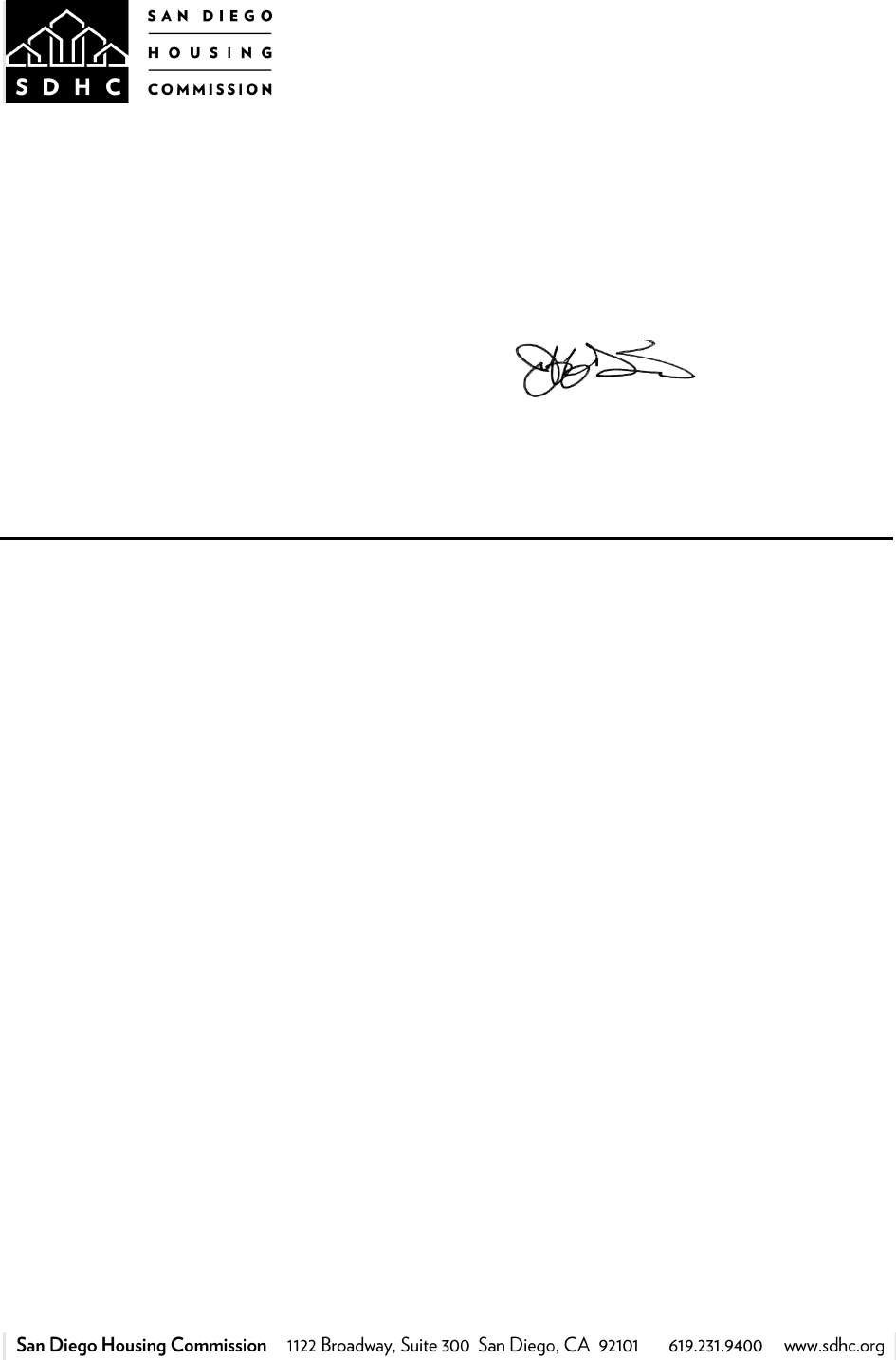
MEMORANDUM
To: Andy Hanau, City Auditor, City of San Diego
From: Jeff Davis, Interim President & CEO
San Diego Housing Commission
Date: February 27, 2023
Subject: Response to City of San Diego Performance Audit of San Diego Housing
Commission’s Homelessness Services Contract Management
The San Diego Housing Commission (SDHC) appreciates the dedication and effort the Office of
the City Auditor committed to conducting this audit. Over the past seven months, your office
demonstrated the conscientiousness and commitment to subject matter research and analysis
necessary due to the complexity of homelessness services and their associated contracts. I wish
to recognize your team’s thoroughness and professionalism during this audit.
This memo provides SDHC management’s response to the audit.
Over the past four fiscal years, the number of contracts SDHC administers for homelessness
services and programs in the City of San Diego increased by over 50%. Simultaneously, the
homelessness services sector experienced a series of challenges, including the Hepatitis A
outbreak in 2017, the worldwide COVID-19 pandemic, the fentanyl crisis affecting San Diego
and cities across the country, and the affordable housing crisis in the City of San Diego. As
recognized in your audit, with a system-level focus and through collaboration with the City of
San Diego and regional service providers, SDHC adhered to its policies and ensured
homelessness services followed national best practices and regional Continuum of Care
Community Standards.
SDHC’s Procurement Department continually explores ways to improve its processes to respond
effectively to SDHC’s increase in activities related to homelessness contract processing and
procurement.
Audit Finding #1: SDHC follows its policies and procedures for contract procurement but can
improve its process to identify sole sourced contractors’ potential conflicts of interest.
Recommendation 1.1: SDHC should issue an Administrative Regulation to require
Statements for Public Disclosure for sole source contracts in accordance with its Conflict
of Interest Policy and collect required statements for all current and future contracts over
$50,000. (Priority 2)
Performance Audit of SDHC's Homelessness Services Contract Management
OCA-23-07
Page 44

2
SDHC Response: Agree with the Recommendation
SDHC will incorporate the requirement into Administrative Regulation 203.100,
Statement of Procurement Services. SDHC anticipates implementing the Administrative
Regulation in May 2023.
In addition, upon being notified of the items noted in the audit, SDHC’s Procurement
Department took the following actions:
• The Statement of Public Disclosure Forms were included in all sole source
procurements going forward.
• All homelessness services providers with sole source contracts were contacted
and required to submit a Statement of Public Disclosure Form by the end of
January 2023. The Procurement Department tracked responses and followed up to
ensure compliance.
• The requirement was incorporated into all memos routed for contract execution
approval.
Recommendation 1.2: When SDHC next updates its Statement of Procurement Policy, it
should require Statements for Public Disclosure for sole source contracts in accordance
with its Conflict of Interest Policy. (Priority 2)
SDHC Response: Agree with the Recommendation
SDHC will conduct a comprehensive review of the Statement of Procurement Policy in
July 2023 to identify necessary updates and will include the above recommendation.
SDHC anticipates implementing the updated policy, subject to required approvals, in
February 2024.
Audit Finding #2: SDHC ensures contracted homelessness services programs follow best
practices through contract design, ongoing administration, and compliance monitoring.
SDHC Response:
Multiple entities coordinate and collaborate with one another to address homelessness in
the City of San Diego. The audit report includes a table displaying the “functional areas
of focus,” respectively, for SDHC, the Regional Task Force on Homelessness, the City of
San Diego and the San Diego City Council. In the specific focus areas for which SDHC
has or shares responsibility, SDHC effectively and efficiently ensures that it fulfills its
responsibilities utilizing best practices in contracted programs and services, across the
homelessness programs SDHC administers.
As the audit report observed, external factors affect the ability for homelessness programs
to achieve some performance metrics, such as staffing challenges and the scarcity of
housing resources available through the Coordinate Entry System (CES) amid historically
low vacancy rates in the city. SDHC works to address these challenges and build system
Performance Audit of SDHC's Homelessness Services Contract Management
OCA-23-07
Page 45

3
capacity. In October 2020, SDHC, in partnership with San Diego City College, launched
the Homelessness Program for Engaged Educational Resources (PEER). The
Homelessness PEER course provides specialized education, training and job placement
assistance to develop the workforce needed for programs and services that help San
Diegans experiencing homelessness. In 2022 SDHC engaged in a compensation study of
homelessness services sector positions to review and consider recommendations for
ensuring competitiveness of wages for critical frontline positions, and launched a
wellness initiative for frontline staff to support sector efforts to attract and retain staff.
Conclusion
The audit’s findings reflect SDHC’s core values and strategic priorities, including a commitment
to excellence and innovation in all we do and being responsible financial stewards of the funding
we deploy.
As noted in the audit, SDHC ensures contracted homelessness services programs follow best
practices, and SDHC closely adheres to its policies for contract procurement. SDHC agrees with
the audit’s recommendations and will implement them to further strengthen our efforts going
forward. The audit confirmed that San Diego residents can rely on SDHC as a responsible leader
in collaborative homelessness solutions.
Performance Audit of SDHC's Homelessness Services Contract Management
OCA-23-07
Page 46

THE CITY OF SAN DIEGO
M E M O R A N D U M
DATE: February 28, 2023
TO: Andy Hanau, City Auditor, Office of the City Auditor
FROM: Hafsa Kaka, Director, Homelessness Strategies & Solutions Department
SUBJECT: Management Response to the Office of the City Auditor’s Performance Audit of
San Diego Housing Commission’s Homelessness (SDHC) Services Contract
Management
______________________________________________________________________________________________
This memorandum serves as the management response to the Performance Audit of San
Diego Housing Commission’s Homelessness Services Contract Management.
The purpose of the audit was to examine homelessness services contracts administered by
the San Diego Housing Commission (SDHC) that started between Fiscal Year 2018 through
Fiscal Year 2022. “The objectives of the audit were to: (1) determine whether SDHC procures
homelessness services contracts according to leading practices; (2) determine whether SDHC
adequately monitors contract compliance; and (3) determine whether SDHC holds contractors
accountable for following best practices in providing homelessness services.”
The scope did not include contracts administered by the Homelessness Strategies and
Solutions Department (HSSD) – the department had not administered any homelessness
services contracts for longer than a year during the scope period. However, HSSD and other
City departments—including General Services Facilities Division and Department of Real
Estate and Airport Management—are involved in maintenance conducted at City-owned and
leased properties used by homelessness services providers.
The Homelessness Strategies and Solutions Department has reviewed the report prepared by
the Office of the City Auditor and thanks the staff involved in conducting the audit. Our
response highlights the recommendations and considerations for implementation as agreed
upon improvements. We also would like to point out that the sample size of shelters that
involve City-owned or leased properties reviewed in the audit does not reflect the City’s
shelter system across the board.
In total, the report has 3 findings with 4 total recommendations of which 1 finding with 2
recommendations are directed to City departments. The City has a documented process for
repairs at City-owned or leased homelessness facilities which can be improved.
Recommendation 3.1: In order to address existing maintenance issues, HSSD should
coordinate with providers, SDHC, and relevant City Departments to perform an inspection of
Performance Audit of SDHC's Homelessness Services Contract Management
OCA-23-07
Page 47

Page 2
Andy Hanau, City Auditor
February 28, 2023
all homelessness services sites for which the City is responsible for maintenance and repairs
and complete any identified repairs and maintenance at those sites. (Priority 2)
Management Response: Agree, already implemented. Since HSSD was established, the
department has coordinated with providers, SDHC, and relevant City Departments to
perform inspections and submit any needed repairs identified. Although HSSD does not have
full control or oversight of completing repairs that are the responsibility of other City
Departments, HSSD will enhance collaboration to yield expeditated results.
Recommendation 3.2: In order to address future maintenance issues at sites where the City
is responsible for maintenance and repairs, HSSD should establish a procedure to track
maintenance requests between providers, SDHC, and relevant City Departments. This
procedure should contain required information for service request correct routing procedures
for request, estimated timelines for repair, and communication of progress and task
completion to SDHC and service providers. (Priority 2)
Management Response: Agree. HSSD has an existing documented process to address
maintenance issues where the City is responsible for property conditions. Like all City
processes, there is room for improvement. HSSD has setup a process of tracking the intake of
service requests and will continue to collaborate with City Departments to track the closure
of service requests.
Thank you for the opportunity to provide responses to these recommendations. Management
appreciates your team’s professionalism throughout this review.
Sincerely,
Hafsa Kaka
Director, Homelessness Strategies & Solutions Department
cc: Paola Avila, Chief of Staff, Office of the Mayor
Eric Dargan, Chief Operating Officer
Kristina Peralta, Deputy Chief Operating Officer
Alia Khouri, Deputy Chief Operating Officer
Kris McFadden, Deputy Chief Operating Officer
Jessica Lawrence, Director of Policy, Office of the Mayor
Matthew Yagyagan, Deputy Director of Policy, Office of the Mayor
Christiana Gauger, Chief Compliance Officer
Penny Maus, Director, Department of Real Estate and Airport Management
Casey Smith, Director, Department of General Services
Performance Audit of SDHC's Homelessness Services Contract Management
OCA-23-07
Page 48

DATE: March 2, 2023
TO: Honorable Members of the Audit Committee
FROM: Andy Hanau, City Auditor
SUBJECT: City Auditor Comments to the Homelessness Strategies and Solutions
Department’s Management Response
________________________________________________________________________
The Office of the City Auditor (OCA) appreciates the Homelessness Strategies and Solutions
Department’s (HSSD) response to the recommendations set forth in our Performance Audit of the
San Diego Housing Commission’s Homelessness Services Contract Management. However, HSSD
stated it had already implemented our recommendation to conduct an inspection of homelessness
facilities and resolve any existing maintenance issues, even though the evidence we gathered
indicated otherwise. Additionally, HSSD stated it already has documented maintenance procedures,
but it only provided draft procedures for two locations. Thus, although HSSD indicates agreement, it
is unclear if HSSD and the City will take the necessary further actions to ensure that potential health
and safety issues at homelessness services facilities are quickly identified and remediated.
Specifically, Recommendation 3.1 states:
In order to address existing maintenance issues, the Homelessness Strategies and Solutions
Department should coordinate with providers, the San Diego Housing Commission, and
relevant City departments to perform an inspection of all homelessness services sites for
which the City is responsible for maintenance and repairs, and complete any identified
repairs and maintenance at those sites. (Priority 2)
We acknowledge the City participates in Joint Hazard Assessment Team (JHAT) visits at some
locations, but some issues that we observed appeared on consecutive JHAT reports with no
information regarding remediation. As the coordinating department, HSSD is responsible for liaising
between City departments. However, when a roof leak required relocation of residents at Golden
Hall, the General Services Department stated that it identified many additional repairs that it was
not aware of, some of which appeared on JHAT reports.
As noted in the report and HSSD’s response, we only visited sites where contracts were
administered by the San Diego Housing Commission. At some of these sites, the City was responsible
for maintenance. As HSSD notes in its response, our sample does not include all shelters. In order to
have assurance that all homelessness services sites are in good condition, it is necessary for the City
to conduct inspections and complete repairs at all sites for which the City is responsible for
maintenance. Therefore, we believe the recommendation is not implemented at this time.
OFFICE OF THE CITY AUDITOR
600 B STREET, SUITE 1350 ● SAN DIEGO, CA 92101
PHONE (619) 533-3165 ● CityAuditor@sandiego.gov
TO REPORT FRAUD, WASTE, OR ABUSE, CALL OUR FRAUD HOTLINE: (866) 809-3500
OCA-23-07
Page 49

Page 2
Honorable Members of the Audit Committee
March 2, 2023
Respectfully submitted,
Andy Hanau
City Auditor
cc: Honorable Mayor Todd R. Gloria
Honorable City Council Members
Honorable City Attorney, Mara Elliot
Eric Dargan, Chief Operating Officer
Paola Avila, Chief of Staff, Mayor’s Office
Kristina Peralta, Deputy Chief Operating Officer
Alia Khouri, Deputy Chief Operating Officer
Kris McFadden, Deputy Chief Operating Officer
Christiana Gauger, Chief Compliance Officer
Hafsa Kaka, Director, Homelessness Strategies and Solutions Department
Penny Maus, Director, Department of Real Estate and Airport Management
Casey Smith, Director, Department of General Services
Charles Modica, Independent Budget Analyst
Jessica Lawrence, Director of Policy, Mayor’s Office
Matthew Yagyagan, Deputy Director of Policy, Mayor’s Office
Recommendation 3.2 states:
In order to address future maintenance issues at sites where the City is responsible for
maintenance and repairs, the Homelessness Strategies and Solutions Department should
establish a procedure to track maintenance requests between providers, the San Diego
Housing Commission (SDHC), and relevant City departments. This procedure should contain
required information for service requests, correct routing procedure for requests, estimated
timelines for repair, and communication of progress and task completion to SDHC and
service providers. (Priority 2)
Although HSSD stated it has documented procedures, as we noted in the report, it was only able to
provide draft procedures for two sites, and the draft procedures have not been properly approved.
Without proper approval and distribution to all stakeholders, there is a risk that other stakeholders
may not be aware of, approve, or follow the procedures. Therefore, it is necessary for the City to
fully develop and approve procedures for all sites. Additionally, HSSD did not provide a target
implementation date for this recommendation.
In closing, we thank HSSD for its cooperation and professionalism throughout this audit. We will
work with HSSD to verify implementation of the recommendations to which it agreed in order to
ensure that existing and future maintenance issues at City-owned and lease homelessness services
facilities are addressed.
OCA-23-07
Page 50
